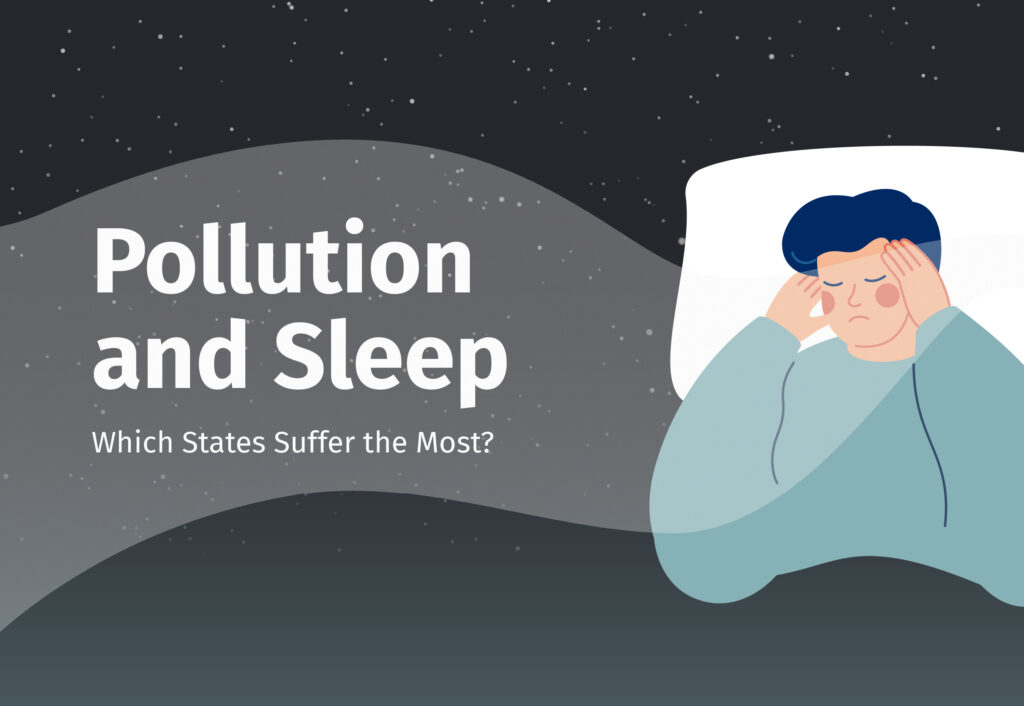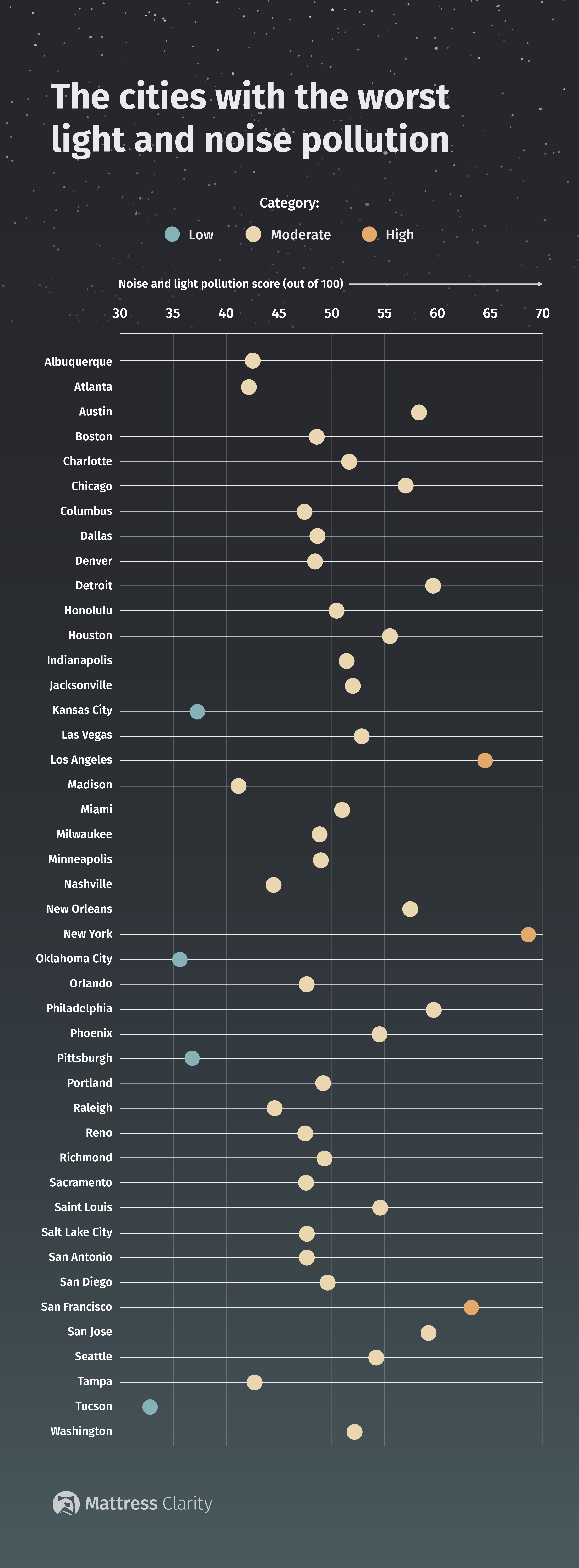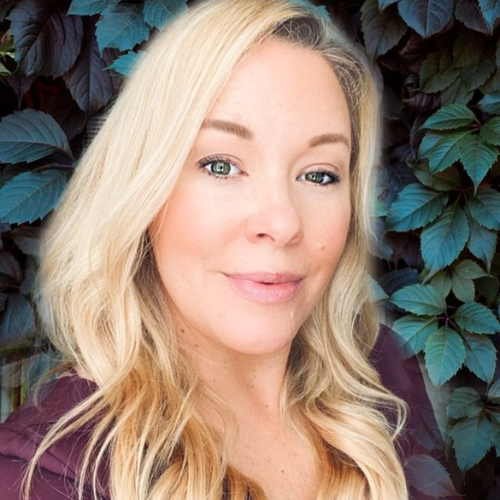Discover how light, noise, and air pollution impact your sleep and which states are the most impacted. How does your state compare?

Exposure to pollutants has been linked to a long list of diseases and disorders that can negatively affect your health. One way pollution can adversely impact your health is by interfering with your ability to get deep, restful, healing sleep.
Exposure to sleep-disturbing pollutants can vary depending on where you live. Find out what types of pollution are most likely to disturb your sleep, which states have the highest and lowest level of pollutants, and what you can do to reclaim your health-promoting sleep if you’re in a high-exposure environment.
Which Environmental Factors Impact Sleep?
Pollutants in your environment can have an adverse effect on your health. Researchers have found that living in a place with cleaner air can actually extend your average life expectancy! Pollution comes in many forms, but these three environmental factors are the ones most likely to disturb your sleep.
3 Types of Pollution Impacting Sleep
When you think of pollution, air contaminants are probably the first thing that comes to mind. Most people understand that breathing in unhealthy particulate matter can have a negative impact on respiratory health and lung function.
Air pollution is a huge concern for your health and well-being, but it’s not the only concern. Two other types of pollution that may be impacting your health and your sleep are noise pollution and light pollution. Let’s explore the ways air, noise and light pollution can keep you from getting the rest you need.
Air Pollution and Sleep
Air pollution is defined by the World Health Organization (WHO) as “the contamination of the indoor or outdoor environment by any chemical, physical or biological agent that modifies the natural characteristics of the atmosphere.”
You can probably picture this in your mind: imagine a city skyline outlined against a thick fog of brown clouds, a long line of vehicles on a freeway belching fuel byproducts into the air, and factory smokestacks pumping chemicals into the sky.
When it comes to air pollution, environmental concerns are usually top of mind. But air pollution can pose a risk to your personal health, including your sleep.
Researchers revealed poor air quality—specifically air pollution and high levels of carbon dioxide—can have a negative impact on sleep.
In a new study published in the journal Sleep Health, researchers found a link between air pollution and carbon dioxide exposure to lowered sleep efficiency. (Sleep efficiency is the percentage of time we spend asleep while in bed. Most healthy young adults have a sleep efficiency of 90%.) Higher levels of particulate matter (pollution) and carbon dioxide were linked to a decline in sleep efficiency in study participants.
“These findings highlight the importance of the bedroom environment for high-quality sleep,” said Mathias Basner, MD, Ph.D., lead study author and Director of Sleep and Chronobiology at Penn Medicine.
Noise Pollution and Sleep
Noise pollution is defined by the Environmental Protection Agency (EPA) as “unwanted or disturbing sound” that interferes with normal activities, such as sleeping, or disrupts or diminishes one’s quality of life.
You may already know that nighttime noise can affect your sleep. It fragments sleep, making it shallower. When your sleep is disturbed by noise from air traffic, vehicle traffic, and crowded city environments, it can result in daytime sleepiness, tiredness, annoyance, mood changes, slower reaction times the next day and lower overall well-being.
Researchers have found that noise pollution can also impact your health by causing increased heart rate and stress hormone release. It’s been linked to headaches, medication use, sleep problems and an increased risk of diabetes, hypertension, stroke and heart disease.
Light Pollution and Sleep
Light pollution is defined as “artificial light that alters the natural patterns of light and dark in ecosystems,” by the United Nations Environment Programme. Light pollution can come from sky glow, illuminated buildings, street lights, security lights and lights from vehicles, to name a few. Researchers have found that light pollution can be harmful to nocturnal and migratory animals, animals in flight and even plants.
So it’s no surprise that light pollution can negatively impact humans, too. Research suggests that people living in more densely populated, light-polluted areas are more likely to report trouble sleeping and are more likely to use sleeping pills.
A study published in the Journal of Clinical Sleep Medicine linked exposure to light pollution at night to sleep problems like insomnia. The research showed that individuals exposed to higher levels of light pollution at night were more likely to rely on sleep medications. They also tended to take these medications for longer periods and in higher doses compared to those who were not exposed to nighttime light.
Your body’s internal clock, known as the circadian rhythm, is powered by light and dark. When you are exposed to bright light in the morning, it kicks off a cascade of hormonal and chemical messengers inside your body to wake up and seize the day. As daylight wanes and your exposure to light decreases, the opposite occurs, and your body starts sending out messages that it’s time to wind down and go to sleep. Light pollution can send the wrong signals and disrupt your body’s natural sleep-wake clock.
What Are The Most Polluted States in the US?
Do you need to be worried about one or more of these sleep-disturbing types of pollution? Unfortunately, your home address may be putting you more at risk; certain states tend to rank higher than others for air, noise and light pollution levels.
In general, highly populated metro areas are most likely to rank higher for noise, light and air pollution. The East Coast is more affected by light pollution than the West Coast, and Hawaii and Alaska are the least affected by air pollution.
Best and Worst States for Air Pollution
The U.S. states with the best ranking for air pollution, based on Air Quality Index, are Hawaii, Puerto Rico, Washington, Nebraska, and Oregon. The states with the worst air quality rankings are California, New Mexico, Utah, Colorado, and Arizona.

Best and Worst States for Noise Pollution
In order to determine how each state ranked for noise pollution, we scored each state based a scale of number of licensed drivers, vehicles, bars/clubs, airports, and population all per 10,000 kilometers squared. According to our research, the states with the best scores for noise pollution were Wyoming, New Mexico, South Dakota, and Maine. On the other hand, the states with the worst noise pollution are Florida, California, New York, and Illinois.

Best and Worst States for Light Pollution
In the United States, the East Coast states are the brightest in the nation. Light pollution decreases as you make your way west, at least until you hit California’s major metropolitan areas, such as San Francisco and Los Angeles. You can search for your city’s light pollution ranking using the interactive light pollution map at lightpollutionmap.info.

Tips to Get Good Sleep in Heavily Polluted Areas
If you’re living in a heavily polluted area, there are steps you can take to reduce your exposure to air, noise or light pollutants and help take back the restful, healing sleep your body needs.
Stay Indoors
On days when air quality is poor, spending time indoors generally reduces exposure to ambient air pollutants. Even though air pollutants like particulate matter, ozone and other gasses make their way inside, they tend to be less condensed indoors compared to outdoors.
Keep Windows Closed
Studies have suggested that there are times when sleeping with the windows open may help you sleep better. But when the air quality is poor, keep them closed. Closing windows and utilizing your HVAC system have been shown to reduce air exchange rates by about 50% and reduce the concentration of environmental pollutants that make their way into your home.
Reduce VOCs in Your Home
Indoor air quality can suffer from contaminants from household items, such as cleaners, personal care products, furnishings, paints and more. These contaminants are known as VOCs (volatile organic compounds). You can reduce the levels of VOC pollutants in your home by choosing low- or no-VOC paint, buying a latex mattress and swapping out chemical cleaning products for more natural alternatives, such as white vinegar or essential oils.
Clean Your Indoor Air
Closing your windows can help reduce the number of environmental pollutants making their way into your home; however, it won’t do anything to remove the VOCs and other pollutants inside your home. Your HVAC system can help filtrate your indoor air, but adding a portable HEPA filter-based air cleaner has been shown in studies to remove pollutants from your home more efficiently.
Breathe Through Your Nose
Your body comes complete with its very own built-in air-filtering device: your nose. Studies have shown that breathing through your nose filters particulate matter more effectively than breathing through your mouth. If you tend to breathe through your mouth, you may consider using mouth tape to relearn how to breathe through your nose while sleeping. And if you have a cold that’s making it difficult to breathe out of your nose, you may want to try nasal strips or a humidifier to make it easier to sleep when you’re sick.
Limit Outdoor Exercise
When air quality is poor, limiting outdoor exercise can help you reduce the amount of air pollution you are exposed to. Studies have shown a 5x increase in particulate matter inside the nostrils of adults who exercised outdoors compared to those at rest. If you can, exercise inside your home or a gym where doors and windows are closed, at least on days with poor air quality. For runners and cyclists, staying 500 feet away from busy roadways can also reduce exposure to air pollution.
Block Out Noise Pollution
If you live in a busy, noisy metro area or simply have neighbors with no concept of “quiet time,” blocking out the noise using noise-canceling headphones and/or white noise can be an effective way to get better sleep. A study on noise-masking earbuds suggests blocking out noise at night can help improve daily sleepiness, tension, and sleep quality. Additional research on white noise and sleep suggests that white noise and other sleep sounds significantly improved participants’ sleep quality, even in noisy metropolitan areas.
Black Out Light Pollution
Light pollution can confuse your circadian clock and make it harder to sleep at night. Blocking out the light from your bedroom at nighttime can help retrain it to send the correct sleep-wake signals. Try dark-colored curtains or black-out curtains to reduce light pollution in the bedroom. If bright light is still making its way in, studies have shown that wearing an eye mask can improve sleep at night and alertness the next day.
The Takeaway
There is no way to avoid all pollution, even if you live in a rural area. But you can reduce your exposure to air pollution, noise pollution and light pollution. When you take steps to reduce your exposure, you can help improve the quantity and quality of your sleep, which your body needs to function properly, and help you achieve the immense health benefits of a good night’s sleep.

